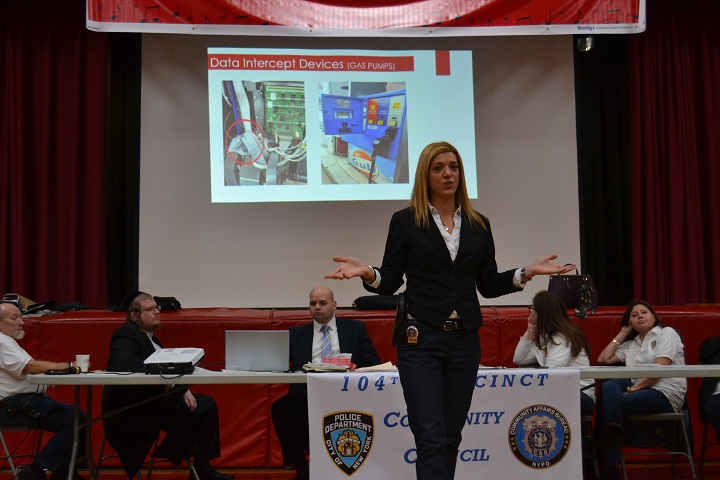Financial crimes are the fastest growing crimes in the world, and many Queens residents wonder how they can step ahead of the high-tech crooks before they steal their money and personal information.
Detective Dina Moretti from the NYPD’s Financial Crimes Task Force outlined what these criminals tend to do and gave tips on how to protect your personal information during Tuesday night’s 104th Precinct Community Council meeting in Glendale.
Two of the more popular methods these crooks use to gather victims’ personal information are data breaches and device skimming.
Data breaches occur at merchant stores and are more commonly known as computer hacks or compromises. Device skimming is when bandits attach a device to an ATM, gas pump or point-of-sale terminal that can capture both debit card information and personal identification numbers. This used to be a popular tactic at bank ATMs.
“Perpetrators have moved away from bank ATM skimming devices — those used to be really hot and really big,” Moretti said. “Now what we’re seeing is they were too easy to monitor. Sometimes the perps were caught, more often cashout trends were noticed right away and accounts were shut down by the bank.”
These criminals now set their sights on standalone ATMs in locations that are not as heavily monitored, such as those at convenience stores, gas stations or hotel lobbies. These locations also give the crooks a larger pool of users from whom they can steal.
Skimmers use a magnetic stripe reader to capture debit card information and often a tiny hidden camera or device overlay to capture customer keystrokes to get the victim’s PIN. Crooks have been known to also use data intercept devices that are hardwired into the ATM or gas pump to capture information as it is passed from the machine to an Internet connection.
Even more technologically advanced methods are being implanted into gas pumps.
“Perpetrators utilize Bluetooth technology where possible to avoid having to come back and recover those skimmers,” Moretti said. “These devices can usually operate indefinitely and are found inside the gas pumps.”
To prevent become a victim of this type of crime, Moretti suggests using ATMs at a bank and always covering your hand when inputting your PIN, as well as paying a clerk at a gas station to minimize the potential of being skimmed.
Data breaches are used in credit card milling scams where crooks brake into a store’s data to get your credit card information, then sell your information online to criminals who will forge fake credit cards with your information. Other locations where your personal information is kept and could potentially be breached is at doctors’/dentists’ offices, car dealerships, hospitals, insurance companies and account or tax offices.
Moretti advised minimizing your online profile, setting alerts for your name, limiting using your debit card at stores and checking for abnormalities at ATMs and point-of-sale terminals as ways to avoid becoming a victim of this crime.



































